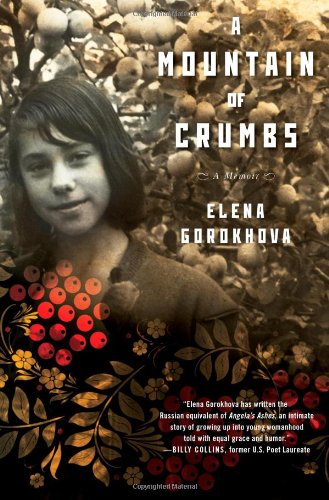Featured book for August

Elena Gorokhova: A Mountain of Crumbs
Why you might be interested:
Leslie and I became voracious readers of Russian emigrants’ memoirs before we wrote Jewish Luck. We wanted to make sure that Vera and Alisa’s memoir added something new to the body of literature and we were interested in seeing how Russian authors presented their culture to a non-Russian audience.
One of the most gripping memoirs we read was A Mountain of Crumbs by Elena Gorokhova. Like Alla and Vera, Elena is Leningrad born. Although she is older than Alla, she attended the same English language school, #238. Elena, however, is not Jewish but she shares a disdain for the vranya (deception) of Soviet life with Alla and Vera.
Gorokhova’s language is lyrical, and it’s clear from her voice that she has mastered the nuances of the English language. We were hooked as soon as we read the opening sentence of her memoir:
“I wish my mother had come from Leningrad, from the world of Pushkin and the tsars, of granite embankments and lace ironwork, of pearly domes buttressing the low sky.”
Gorokhova begins her memoir with her mother’s experiences in the Great Patriotic War and then moves to her own birth and growing up years in Leningrad concluding with her marriage to an American and immigration to the US before the break up of the Soviet Union.
Elena’s mother came from a provincial town, daughter of a peasant. Her mother grew up along with this new Union of Soviet Socialist Republics and she benefitted from the educational opportunities. Elena talks about the mirror images of mother and motherland, both “overbearing, protective and difficult to leave.” Her mother wanted poryadok (order) after a childhood of war and deprivation. In this non-Jewish Russian family, they have memories of Stalin’s men arbitrarily taking a relative away – in their case for a nonpolitical joke that Uncle Volya told.* (Uncle Volya’s joke: “Two militiamen are invited to Comrade Kozlov’s birthday party. What should we give him?” asks one. The best gift is a book, says the other. “No,” says the first militiaman. “Comrade Kozlov already has a book.”)
One outcome of her mother’s upbringing was that Elena was protected, learning the same rules that Vera and Alla did about conversations na doma (at home) and na ulitze (outside), but Elena had far less information than did Vera and Alla about the world outside of the USSR. Her mother was just as likely as Vera and Alla’s to discriminate between intelligentni (cultured and educated people) and those who were not. She also eschewed vodka and alcoholism.
Although Elena was not Jewish she felt oppressed as well by the restrictions of the Soviet Union. She was rejected from the day program of Leningrad State University because of her mother’s profession and had to attend the night program. However, she, shared a disdain for the vranya (deception)of Soviet life with Alla and Vera, but had to play the “game.” Her first job was a monumental disappointment and just as boring as the job which Alla described. She forged documents to be able to privately tutor English. Both Alla and Elena’s leavetaking from their families was painful. However, Alla’s departure was strategized over years while Elena met an American at a time when she was willing and ready to consider emigration though this had not been a life plan.
Elena describes suffering through the same preschool/kindergarten traumas with rigid teachers. As punishment for leaving the group to explore the courtyard during a recess, her teacher had her stand in the corner for an hour and then shouted to the five year old, “you’re a year away from real school where they won’t be so lenient…You’ll be lucky to end up sweeping the streets. I can just see you, an eighteen-year-old-hooligan with a broom”.
In her intensive study of the English language, Elena came across a word she could not translate “privacy.” Her teacher could not help her either and decided it was a concept not in the Russian language. The concept of love and the mystery of sex was also indecipherable to the adolescent girl.
Gorokhova also highlights some interesting points which we missed. While in Jewish Luck, we mentioned Vera referring to Leslie as svoi chelovek (my own person), Gorokhova explains that the opposite phrase is chuzhoi (foreign, strange) “..we can count svoyi on the palm of our hand – my grandparents, my Uncle Vova…my aunt and three cousins.” Chuzhoi refers to everyone else and they, according to Gorokhova, were not worthy of compassion in her mother’s eyes.
Life was certainly difficult for Jews in Russia. Gorokhova’s book suggests that for any questioning, intelligent and independent woman, twentieth century Russia was not a welcome home.
“Lock up what you think. What’s inside you no one can touch,” was the advice that Gorokhova’s grandmother gave. Unfortunately, even today this advice may still be essential to survival.
Find out more
To read more about Elena Gorokhova, see her website: http://elenagorokhova.com/the-book/. Her new memoir, Russian Tattoo willbe published by Simon and Schuster and appear in January 2015. It continues the journey begun in A Mountain of Crumbs. Gorokhova currently lives in Ridgewood, New Jersey.